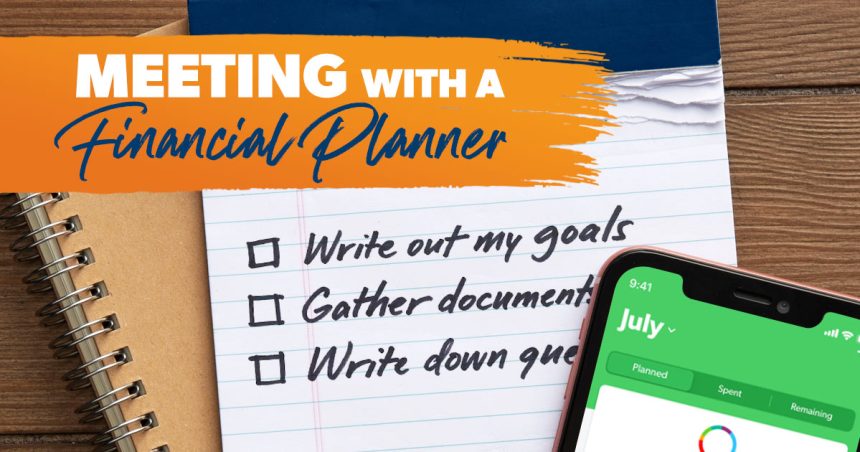Preparing for your first meeting with a financial planner? Congrats! That’s a big step!
It’s no secret that a lot of Americans feel clueless and helpless about retirement. Not having a solid plan could create an uncomfortable retirement that leaves you strapped for income and dependent on your children. And that’s not okay!
So how can you turn the tables and live the retirement of your dreams?
A retirement study commissioned by Ramsey Solutions shows getting help from a financial planner can be a big-time confidence boost: Americans who work with a professional are nearly twice as likely as those who don’t to say they are very confident they’ll have enough money to retire.
If you’ve never sat down with a financial planner before, that first step can feel intimidating, but knowing what to expect can ease your anxiety.
What Is a Financial Planner?
Before you meet with a financial planner, first make sure you know what one actually does. A financial planner is a qualified investment professional. They partner with you over the long haul and work with you to meet your financial goals. In other words, they are go-to experts who know how to make your money grow—so you can achieve your dreams.
What Should I Do Before Meeting With a Financial Planner?
After you schedule your first appointment, you’ve got some homework to do. If you’re married, you need to sit down with your spouse and discuss your future together. Dream about what you want your retirement to look like. Coming to the table with a clear set of shared goals makes it easier to figure out which direction is right for you.
If you’re single, sit down with an accountability partner first—someone you trust and who knows you well. Talk about your future dreams with them and ask for feedback. This forces you to think through your goals in detail—so you can dream in high definition before you try to communicate those dreams to your investing professional.
Here are a few questions to ask yourself before meeting with a financial planner:
-
When would I like to retire?
-
What does my dream retirement look like?
-
Do I plan to work in retirement?
-
How will I pay for my kids’ college education?
-
Who will be my beneficiaries?
What Do I Bring to a Meeting With a Financial Planner?
Your financial planner can’t help you reach your retirement goals if they don’t know where the starting line is—or what hurdles you’ll need to clear to get to the finish line.
That’s why you’ll need to bring some information to your first meeting. The person you work with can give you specific guidance on what documents to bring, but paperwork may include:
-
401(k) and other investment plan statements
-
Mortgage and other debt statements (Hint: You shouldn’t start investing until you’re debt-free, besides the house.)
-
Pay stubs for you and/or your spouse
-
Your most recent tax return
-
Your monthly budget
A good document to prepare first is your monthly budget. You want to give your financial planner accurate insight into how much you earn, spend and save in a month.
Go a step further and identify which of your expenses are fixed and variable. Fixed items like bills are expenses you pay no matter what kind of income you make each month. Variable expenses include items that you wouldn’t spend money on if you lost income—such as going out to eat or to the movies.
Looking at your spending patterns during your first meeting will allow your financial planner to determine how much you could reasonably save and invest on a monthly basis—or where you could cut back to save and invest more.
What Should I Expect From My First Meeting With a Financial Planner?
If you’re the “CEO” of your household—that’s Chief Everything Officer—then consulting a financial planner is like working with your Chief Financial Officer. So, treat your first meeting like an interview for a new position on your team.
Market chaos, inflation, your future—work with a pro to navigate this stuff.
Don’t look at this first meeting as a one-way conversation. It’s an opportunity to determine whether the professional is a good fit for you.
Pay attention to the service you receive from the rest of the staff too. Make sure you feel comfortable with everyone you interact with, from the front desk to the planner’s office.
You should never invest in anything you don’t understand. So, don’t expect to make big decisions the first time you sit down with a financial planner. You’ve got some learning to do first!
What Questions Should I Ask a Financial Planner?
An honest professional will take time to answer your questions, so you can make the best decision with your money. Ask questions about:
Some financial professionals don’t charge an hourly rate for consultations. They might be compensated by a one-time commission or an annual maintenance fee.
What Questions Will a Financial Planner Ask Me?
A good financial planner will ask you about your goals:
-
What do you want to achieve?
-
What’s most important to you?
-
What do you want your life to look like?
Then they’ll explain ways you can meet those goals through an investing strategy that works best for you.
What Happens After I Meet With a Financial Planner?
By the end of the first meeting, you should have a clear understanding of everything you discussed with the financial planner—including next steps.
You can expect things to get more tactical in the second and sometimes third meetings. Based on the goals you shared, your planner will help you develop a timeline and a monthly savings plan for each of your goals.
That’s when you’ll decide where to spread your investments—such as different types of mutual funds—which will determine the long-term return of your portfolio.
At the end of the meeting, you’ll have a strong understanding of where you are financially, where you want to be, and how you’ll get there.
Plan on coming back for annual check-ins. That gives you and your financial planner a chance to review your investments together to ensure they’re performing as expected and you’re making progress toward your goal.
What if I Feel Behind?
Everyone wants a future they can look forward to. But it’s easy to let negative emotions—like guilt, shame or stress—keep you from getting the help you need. You can still make some positive decisions moving forward.
Want to feel more confident about your future and start doing something about it? Try our SmartVestor program! It’s a free and easy way to get connected with qualified investing professionals in your area. Find your pro today!
Interested in becoming a SmartVestor Pro? Let us know.
This article provides general guidelines about investing topics. Your situation may be unique. To discuss a plan for your situation, connect with a SmartVestor Pro. Ramsey Solutions is a paid, non-client promoter of participating Pros.
Read the full article here
















